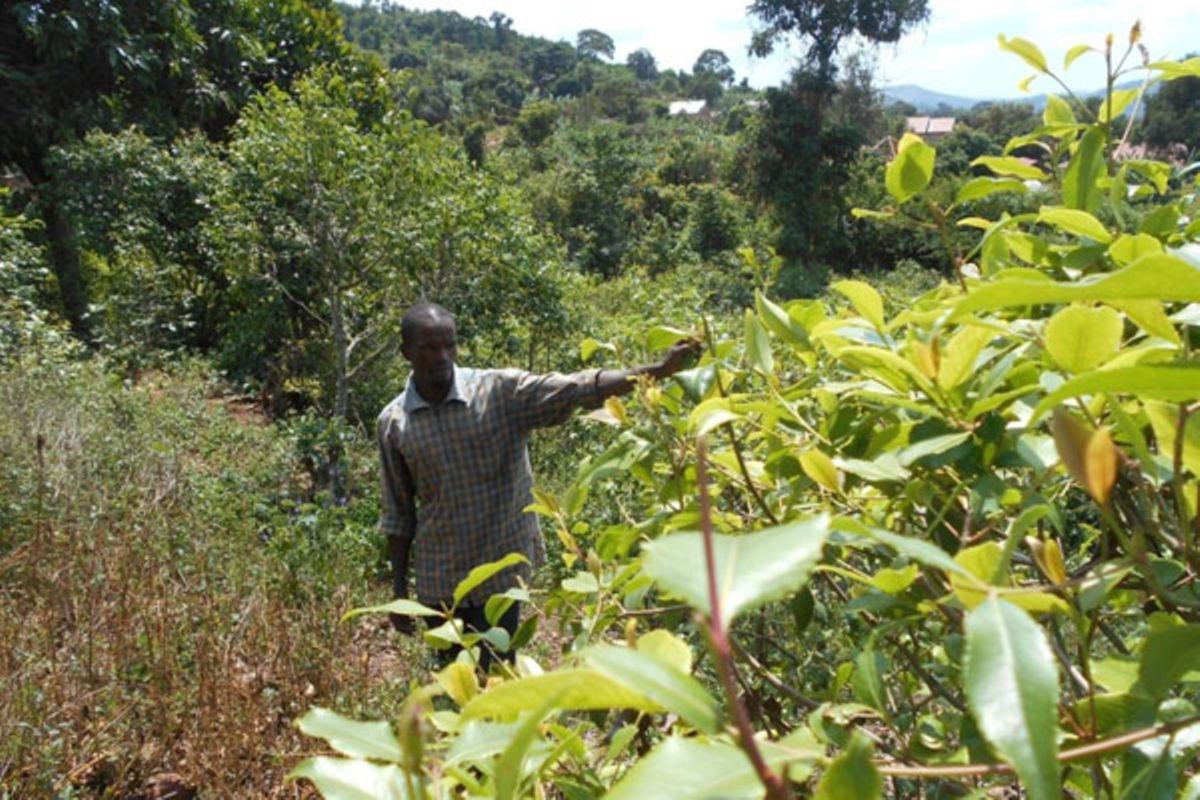A group of Mairungi/Khat growers in Tooro sub-region, under their umbrella body Kabarole Mairungi Growers Association, have petitioned President Yoweri Kaguta Museveni, beseeching him not to pass the Narcotic Drugs And Psychotropic Substances Bill (2023) as it is, arguing that is aimed at cutting off their main source of income and livelihood.
The members of the Association which is registered by the Kabarole District Community Development Office, with over 150,000, operate their Mairungi growing business in the area of Burahya constituency, in the Sub-counties of Hakibaale, Kichwamba, Rwengaju, Busoro, Kabende and the Town Councils of Kiba and Kajura.
According to their petition to President Museveni dated September 07, 2023, which has since been received by the President’s Office at State House, the Mairungi growers contend that although Parliament passed the impugned Bill and it was gazetted on May 17th, 2023, they were never consulted, yet they are key stakeholders who are bound to be directly affected in case it is passed into law.

They argue that Mairungi/Khat, which was introduced to Tooro sub-region in the 1930s, is wrongly classified in the Bill as a dangerous plant, together with four other plants which include; Cannabis, Coca Bush, Papaver Somniferum and Papaver Segiterum.
“We never had an opportunity to make an input to this very important process that is bound to result in the enactment of a piece of legislation that will definitely have a tremendous negative impact on our social and economic lives…” their Petition, which was delivered to the State House by Hon. Amanyire John Kasweta, states in part.

The Petitioners also argue that whereas Mairungi/Khat is classified in Schedule 4 of the said Bill together with other plants as being illegal and dangerous to human health, this claim has never been scientifically proven, hence the Bill must be revised and amended to that effect.
“In that regard, Your Excellency, we humbly appeal to you to consider our recommendations thus;
a) That Khat be excluded from the list of prohibited plants by amending Schedule IV of the Bill.
b) A comprehensive scientific study be commissioned to establish, among others, the concentration levels of substances that might be considered dangerous; and the pharmacological benefits that may be derived from Khat.
c) That a comprehensive legal, policy and regulatory framework be developed to provide for value addition and support of the local population in Khat growth and distribution.
They argue that this ill-informed Bill, if signed into law by the President, will directly and indirectly affect the livelihoods of over five million people, who are involved in the cultivation and distribution of Mairungi in parts of western Uganda.

Alternative Means Of Survival
The petitioners, led by their chairperson Tinkamanyire Johnson, contend that although they appreciate the fact that the Bill is evidently intended for the good of the people of Uganda and is within the United Nations Convention against illicit trafficking in Narcotic Drugs and Psychotropic Substance, the government ought to put into consideration the huge number off Ugandans that will be affected by this law.
They argue that whereas it is government policy for parliament to consult groups that are likely to be affected by a particular law that is about to be enacted, parliamentarians not only neglected to do this, but also never put in place a framework to rehabilitate those who would be affected by the law, or establish a policy to put in place alternative income generating measures for them, which is utterly unfair.
They are of the view that parliament ought to have appreciated the fact that these Mairungi growers not only pay taxes to the government and provide employment for several youths but have also managed to improve their livelihoods and educate their children using income generated from their activities, which will be cut off once the law comes into force.

According to the Petition, the groups of people that will be affected by the new law include; Farmers, transporters, dealers, distributors, market vendors, and producers of packaging materials, among others, among them over 100,000 households that are directly involved in the cultivation, distributions and marketing of Mairungi.
They note that had they been consulted prior to the passing of the Bill, they would have been in a position to furnish the relevant Parliamentary Committee with all the necessary facts as to why Mairungi was wrongly classified with other plants as a dangerous plant, plus why it is the economic backbone for many people in Tooro sub-region.
“We believe that Khat is not a dangerous drug that should be lumped with the rest of the Narcotic drugs that the Bill seeks to regulate. Our appeal may not be based on scientific research, since we just got to learn about the issue after the Bill had been passed by Parliament, so there was no sufficient time to commission scientific research to back our proposal… However, we are aware that your Excellency, you have on various occasions sought scientific evidence to prove some facts before decisions, particularly those that affect the ordinary Ugandan, are taken. We are aware, and it is on record that you sought the assistance of scientists before you assented to the Anti-Homosexuality law. But we have not come across any evidence to suggest that Parliament sought the services of a scientific report about the toxicity of Khat for them to arrive at the decision as they did…..” the Petitioners contend.

The Narcotic Drugs and Psychotropic Substances (Control) Bill, 2023, was first tabled for the first reading in May and consequently referred to the Committee on Defence and Internal Affairs for further scrutiny. Prior to the re-tabling of the Bill, the Constitutional Court nullified the Narcotic Drugs and Psychotropic Substances (Control) Act, 2015, due to a lack of quorum at the time it was passed by Parliament.
To this end, therefore, fresh efforts were made to have the legislation reworked and processed through the committee stage, which led to detailed deliberations of the draft law.

PROVISION IN BILL
Any person or owner of land who has reason to believe that his or her land will be used for the cultivation of the prohibited plant will have to pay Shs 1 billion or an amount equivalent to a fee that is three times the market value of the said drug at the time of apprehension or face jailed for five years or both.
What Experts Say
Whereas researchers pointed out some harmful effects of consuming the plant, others say the substance isn’t harmful enough to warrant classification as a narcotic adding that farmers should be left to grow and trade khat.
Tonny Ssekamatte, a public health specialist at Makerere University, says that studies and experience have shown that while khat is still a psychotropic substance, it isn’t dangerous. He says there are substances with worse effects, like marijuana and alcohol, which better deserve the government’s focus.
“When banning khat, we need to examine what passing a law will mean for farmers and its economic benefits,” he says. Although he sees a need for some level of regulation, he believes the focus should be on more harmful drugs.

For some local Ugandan consumers, khat is a stimulant that helps them cope with strenuous work. Nasser Murungi drives a boda boda, or motorcycle taxi, and says he takes it daily. It keeps him alert when he is working in the evening. But he is aware of the negative effects it might have, particularly when mixed with alcohol, which he says he tries to avoid.
Chewed like tobacco, khat grows wild across high-altitude regions of Africa and Asia. It was first farmed in Yemen and Ethiopia, where its consumption as a stimulant goes back at least 1,000 years, according to “Ethnic Identity and Development: Khat and Social Change in Africa,” a book published in 2010 by anthropologist Susan Beckerleg.
Between the 1930s and the 1980s, travellers from Yemen and Somalia taught Ugandans to cultivate khat, sparking its production throughout the country, including in Mount Elgon in the east, Karamoja in the north and Kabarole district in the southwest.

Regionally, khat is legal in Ethiopia, Kenya, Somalia and Djibouti. It’s outlawed in Tanzania and Eritrea, according to a 2022 report from the Rift Valley Institute, a research group founded in Sudan.
Because of this patchwork of competing laws, trade routes have been established to export khat across the continent and around the world. For example, khat from the Horn of Africa region is regularly ordered online — usually using the dark web — and mailed to France, according to a 2018 report from Interpol.
Its production in Uganda picked up during the war and turmoil of the 1970s and ’80s and expanded even more afterwards until it was grown commercially around the country, primarily in areas like Butambala and Kasenge in central Uganda, or in the north in Arua and Lira.
It is hard to estimate how much khat Uganda produces or its contribution to the country’s economy; but for individual farmers, the plant is their lifeline. The Wakiso Miraa Growers and Dealers Association has registered about 2 million khat farmers across the country, says chairman Kizito Vincent.
If enforced, the law would mean many farmers lose their livelihood. “This did not just impact my livelihood but the people I, directly and indirectly, employ that couldn’t now take their children to school or provide basics,” says Nsubuga, who employs about 40 people at his 37-acre khat farm in Kasenge.
Various medical reports have indicated that chewing khat, also known as miraa in some parts of the world, leads to increased energy levels, alertness, confidence and mood elevation.
![]()




























